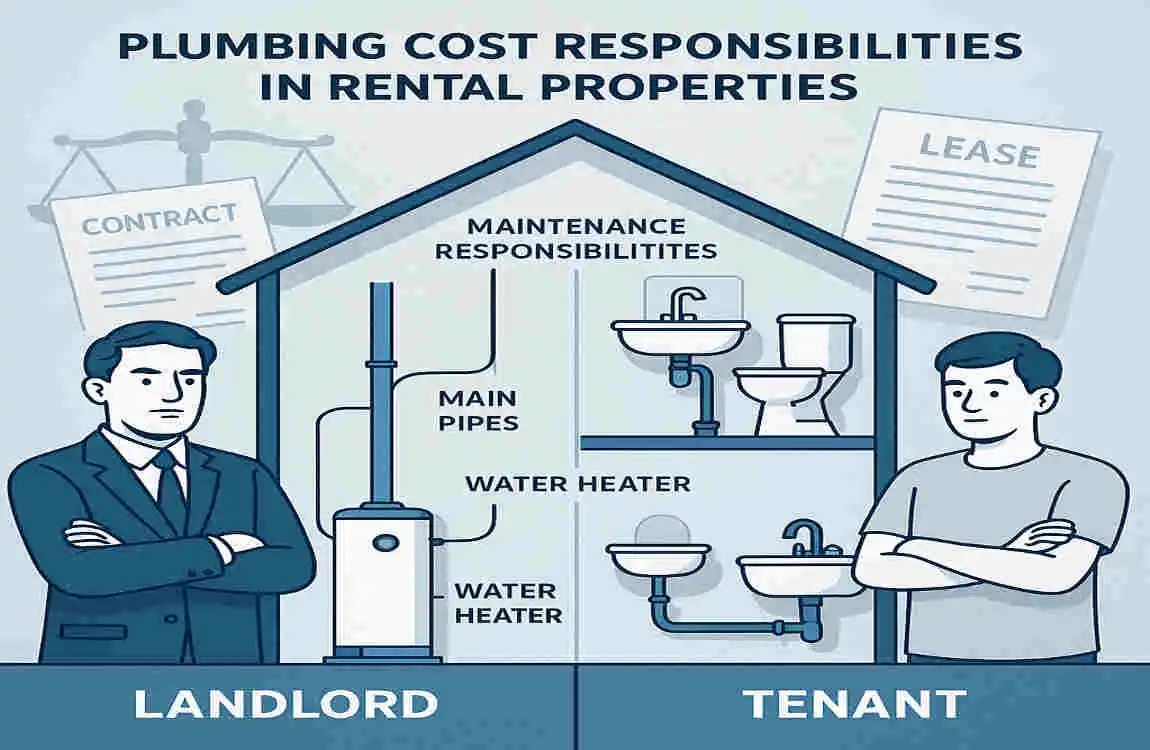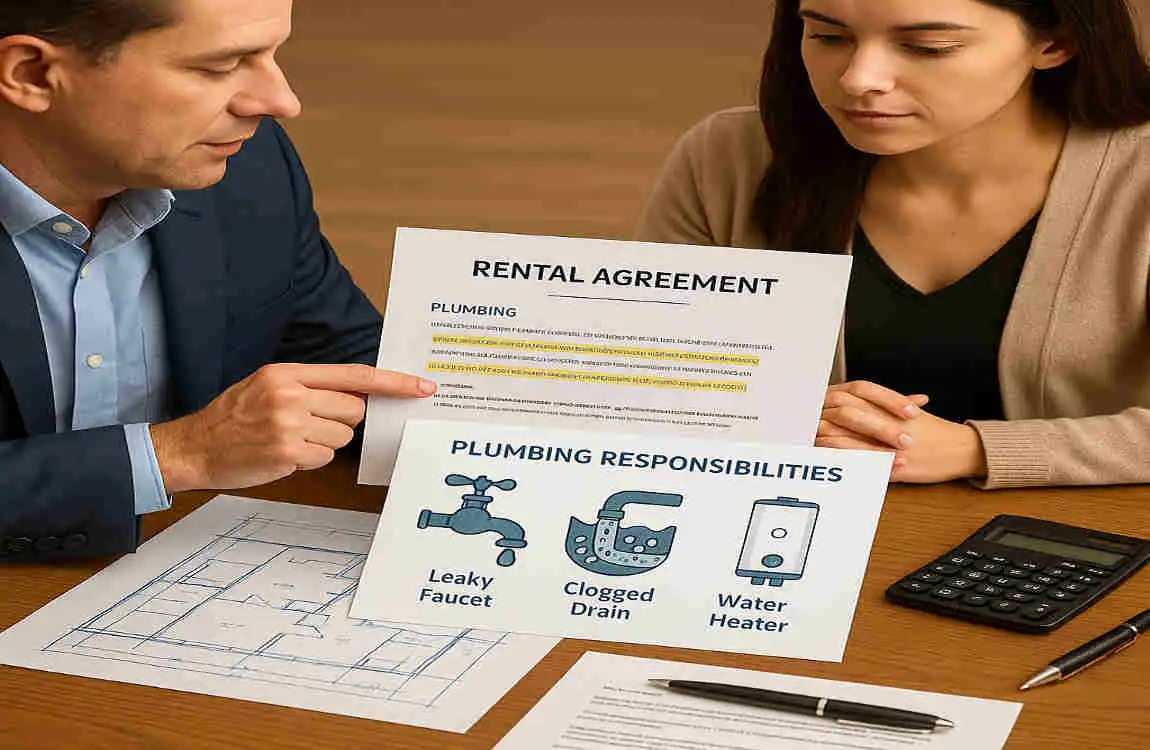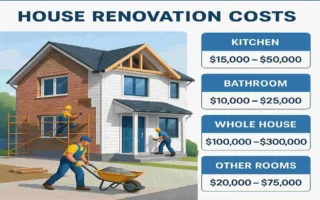When you’re renting a home, it’s crucial to understand who is responsible for covering the costs of plumbing issues. It’s a common source of confusion for both tenants and landlords.
Understanding Plumbing Responsibilities in Rental Agreements

Defining Plumbing Maintenance vs. Plumbing Repairs
First things first, let’s clarify the difference between plumbing maintenance and plumbing repairs. Plumbing maintenance refers to routine tasks that keep the plumbing system in good working order, such as drain cleaning and pipe inspections. On the other hand, plumbing repairs involve fixing issues that arise, like clogged drains or leaking faucets.
How Typical Rental Agreements Address Plumbing Issues
Most rental agreements outline the responsibilities of both the tenant and the landlord regarding plumbing. However, these terms can vary widely, so it’s essential to read and understand your specific lease agreement. Some leases may state that the landlord is responsible for all plumbing repairs, while others may put the onus on the tenant for particular issues.
Importance of Reading and Understanding Lease Terms
As a tenant, it’s crucial to carefully review your lease agreement and ask questions about any unclear terms related to plumbing. Don’t hesitate to request clarification from your landlord or property manager. Remember, a little upfront effort can save you headaches and unexpected costs down the line.
Example Clauses to Look For
Here are some example clauses you might find in a rental agreement regarding plumbing:
- “Landlord is responsible for all plumbing repairs, including clogged drains and leaking faucets.”
- “Tenant is responsible for maintaining the plumbing system and preventing issues through proper use.”
- “In the event of an emergency plumbing issue, the tenant must notify the landlord immediately, and the landlord will arrange for repairs at their expense.”
Who Pays for Routine Plumbing Maintenance?
Explanation of Routine Maintenance Tasks
Routine plumbing maintenance involves tasks like:
- Cleaning drains to prevent clogs
- Inspecting pipes for leaks or damage
- Checking water pressure and flow
- Testing the functionality of fixtures and appliances
Landlord’s Responsibility: Ensuring Functionality and Safety
In most cases, the landlord is responsible for ensuring that the plumbing system is functional and safe for tenants. This means they should perform regular maintenance to prevent issues and keep the system in good working order.
Tenant’s Responsibility: Preventing Issues Through Proper Use
As a tenant, your primary responsibility is to use the plumbing system properly and avoid causing damage or clogs. This includes:
- Not flushing inappropriate items down the toilet (e.g., paper towels, feminine products)
- Avoid pouring grease or oil down the drain
- Reporting any issues or leaks promptly to the landlord
Tips for Tenants to Avoid Costly Plumbing Problems
Here are some practical tips to help you avoid costly plumbing issues as a tenant:
- Run hot water through the drains regularly to prevent buildup
- Use a drain strainer to catch hair and debris
- Avoid using chemical drain cleaners, as they can damage pipes
- Report any slow drains or leaks to your landlord as soon as possible
Handling Emergency Plumbing Repairs
What Qualifies as an Emergency Plumbing Repair?
An emergency plumbing repair is any issue that poses an immediate threat to the safety or habitability of the rental property. Examples include:
- Burst pipes
- Severe leaks are causing water damage
- Sewage backups
- Loss of water supply
Who Typically Covers Emergency Repairs Under Local Rental Laws?
In most cases, the landlord is responsible for covering the costs of emergency plumbing repairs. However, this can vary depending on local rental laws and the specific terms of your lease agreement.
Steps Tenants Should Take When an Emergency Plumbing Issue Arises
If you encounter an emergency plumbing issue, follow these steps:
- Shut off the water supply, if possible, to minimize damage.
- Contact your landlord or property manager immediately to report the issue.
- Take photos or videos of the damage for documentation purposes.
- Follow any instructions provided by your landlord for addressing the issue.
Importance of Prompt Communication Between Tenant and Landlord
When it comes to emergency plumbing repairs, prompt communication between the tenant and landlord is crucial. As a tenant, you should notify your landlord as soon as possible, even if it’s outside of regular business hours. This allows the landlord to take swift action to mitigate damage and arrange for repairs.
Common Plumbing Repairs and Cost Allocations
List of Common Repairs
Some of the most common plumbing repairs in rental properties include:
- Clogged drains
- Leaking faucets
- Water heater repairs
- Pipe bursts
Cost Responsibility Breakdown
The responsibility for covering the costs of these repairs can vary depending on the specific issue and the terms of your lease agreement. Here’s a general breakdown:
- Clogged drains: Typically, the tenant’s responsibility if caused by improper use, but the landlord may cover them if they’re due to a larger plumbing issue.
- Leaking faucets: Usually the landlord’s responsibility, unless caused by tenant negligence or misuse.
- Water heater repairs: Generally, the landlord’s responsibility, as the water heater is considered part of the property’s infrastructure.
- Pipe bursts: Almost always the landlord’s responsibility, as this is a significant issue that affects the habitability of the property.
Examples of Scenarios and Cost Handling
Let’s look at a few example scenarios to illustrate how costs are typically handled:
- Scenario 1: A tenant clogs the toilet by flushing inappropriate items. The tenant is usually responsible for the cost of unclogging the toilet.
- Scenario 2: A pipe bursts due to age and wear, causing water damage. The landlord is typically responsible for the cost of repairs and any resulting damage.
- Scenario 3: A faucet starts leaking due to a worn-out washer. The landlord is usually responsible for the cost of repairing or replacing the faucet.
Impact of Tenant Negligence or Misuse
If a plumbing issue is caused by tenant negligence or misuse, the tenant may be held responsible for the repair costs. For example, if a tenant pours grease down the drain and causes a clog, they may be required to cover the cost of unclogging the drain. Tenants need to use the plumbing system properly to avoid these situations.
Legal Framework: Plumbing Cost Responsibilities in Rental Properties

Overview of Landlord-Tenant Laws
Landlord-tenant laws regarding plumbing responsibilities can vary significantly from one region to another. In general, these laws aim to ensure that rental properties are habitable and that tenants have access to basic necessities, such as running water.
How Local Laws Influence Cost Responsibilities
Local rental laws can influence who is responsible for covering plumbing costs in several ways:
- Implied warranty of habitability: Many regions have laws that require landlords to maintain rental properties in a habitable condition, which includes functioning plumbing.
- Repair and deduct laws: Some areas allow tenants to deduct the cost of necessary repairs from their rent if the landlord fails to address the issue promptly.
- Retaliation laws: These laws protect tenants from landlord retaliation for requesting repairs or asserting their rights under the lease agreement.
Rights and Obligations of Both Parties
Both tenants and landlords have rights and obligations when it comes to plumbing issues in rental properties:
- Tenant rights: Tenants have the right to a habitable living space, which includes functioning plumbing. They also have the right to request repairs and, in some cases, withhold rent if the landlord fails to address the issue.
- Tenant obligations: Tenants are obligated to use the plumbing system properly and report any problems promptly to the landlord.
- Landlord rights: Landlords have the right to enter the property to make necessary repairs, with proper notice to the tenant.
- Landlord obligations: Landlords are obligated to maintain the plumbing system and make repairs promptly to ensure the property remains habitable.
When Tenants Can Withhold Rent or Request Repairs Legally
In some cases, tenants may be able to legally withhold rent or request repairs if the landlord fails to address a plumbing issue:
- Withholding rent: If the plumbing issue makes the property uninhabitable, tenants may be able to withhold rent until the issue is resolved. However, this should be done in accordance with local laws and after proper notification to the landlord.
- Repair and deduct: In some regions, tenants can pay for necessary repairs themselves and deduct the cost from their rent if the landlord fails to address the issue within a reasonable timeframe.
How to Protect Yourself as a Tenant Regarding Plumbing Costs
Documenting Plumbing Condition Before Moving In
One of the best ways to protect yourself as a tenant is to document the condition of the plumbing system before you move in. Take photos or videos of all plumbing fixtures, drains, and pipes, and make note of any existing issues. This can help you avoid being held responsible for pre-existing problems when you move out.
Reporting Plumbing Problems Promptly and Properly
If you encounter a plumbing issue during your tenancy, it’s crucial to report it promptly and thoroughly to your landlord. Follow these steps:
- Notify your landlord in writing: Send an email or letter to your landlord documenting the issue, including photos if possible.
- Request a timeline for repairs: Ask your landlord when they expect to address the issue and keep a record of their response.
- Follow up if necessary: If the issue isn’t addressed within a reasonable timeframe, follow up with your landlord and, if necessary, escalate the matter to local housing authorities.
Keeping Communication Records with the Landlord
Keep a record of all communication with your landlord regarding plumbing issues. This includes emails, letters, and any phone conversations. These records can be invaluable if disputes arise over who is responsible for the repair costs.
Understanding Security Deposit Deductions
When you move out, your landlord may attempt to deduct the cost of plumbing repairs from your Security deposit. To protect yourself:
- Review your lease agreement: Understand what types of repairs your landlord can legally deduct from your deposit.
- Document the condition of the plumbing: Take photos or videos of the plumbing system when you move out to demonstrate its condition.
- Dispute any unfair deductions: If you believe your landlord is unfairly deducting plumbing repair costs from your deposit, dispute the charges and, if necessary, take legal action.
What Landlords Should Know About Plumbing Cost Responsibilities
Landlord Duties to Maintain Plumbing Systems
As a landlord, your primary duty is to maintain the plumbing system in a way that ensures the property remains habitable for your tenants. This includes:
- Regular maintenance: Performing routine maintenance tasks like drain cleaning and pipe inspections to prevent issues.
- Prompt repairs: Addressing any plumbing issues promptly to minimize damage and maintain habitability.
- Emergency response: Having a plan in place for addressing emergency plumbing issues, such as burst pipes or severe leaks.
Importance of Clear Lease Terms
Having clear, specific terms in the lease agreement regarding plumbing responsibilities is crucial for avoiding disputes and ensuring that both parties understand their obligations. Landlords should:
- Specify who is responsible for different types of plumbing issues: Clearly outline who pays for routine maintenance, repairs caused by normal wear and tear, and repairs caused by tenant negligence or misuse.
- Include a timeline for repairs: Specify how quickly the landlord will address plumbing issues after being notified by the tenant.
- Outline the process for emergency repairs: Detail how emergency plumbing issues will be handled and who is responsible for covering the costs.
When to Hire a Professional Plumber vs. DIY Repairs
Risks and Benefits of DIY Plumbing Repairs
As a tenant, you may be tempted to attempt DIY plumbing repairs to save money. However, there are risks and benefits to consider:
- Benefits: DIY repairs can be less expensive and more convenient than hiring a professional, especially for minor issues like unclogging a drain.
- Risks: Attempting complex repairs without proper knowledge and tools can lead to further damage, safety hazards, and potentially higher costs in the long run.
When Professional Plumbing Services Are Essential
In some cases, hiring a professional plumber is essential:
- Major issues: For major plumbing issues like burst pipes, severe leaks, or sewage backups, a professional plumber is necessary to ensure the problem is diagnosed correctly and repaired.
- Complex repairs: If you’re unsure how to perform a repair or lack the required tools and knowledge, it’s best to leave it to a professional to avoid causing further damage.
- Safety concerns: If a plumbing issue poses a safety risk, such as a gas leak or electrical hazard, a professional plumber should be called immediately.
How to Choose a Licensed Plumber and Cost Considerations
When hiring a professional plumber, consider the following:
- Licensing and insurance: Ensure the plumber is licensed and insured to work in your area.
- Experience and reputation: Look for a plumber with a good reputation and experience handling similar issues.
- Cost estimates: Get multiple estimates from different plumbers to compare costs and ensure you’re getting a fair price.
- Warranty and guarantees: Ask about any warranties or guarantees on the work performed.
Who Typically Pays for Calling a Plumber?
Who pays for calling a plumber can depend on the specific issue and the terms of your lease agreement:
- Landlord’s responsibility: In most cases, the landlord is responsible for covering the cost of calling a plumber for repairs that are their responsibility, such as those caused by normal wear and tear or emergency issues.
- Tenant’s responsibility: If the plumbing issue is caused by tenant negligence or misuse, the tenant may be required to cover the cost of calling a plumber.
Tips for Negotiating Plumbing Cost Responsibilities in Rental Agreements

How Tenants Can Negotiate Lease Clauses
As a tenant, you may be able to negotiate the terms of your lease agreement regarding plumbing responsibilities:
- Research local laws: Understand your rights and obligations under local landlord-tenant laws to inform your negotiations.
- Propose fair terms: Suggest lease clauses that fairly allocate plumbing responsibilities between you and the landlord.
- Be willing to compromise: Be open to finding a middle ground that works for both parties.
Importance of Clarity and Documentation
When negotiating plumbing cost responsibilities, it’s crucial to ensure the terms are clear and well-documented in the lease agreement. This helps avoid disputes and ensures that both parties understand their obligations.
Common FAQs About Plumbing Costs in Rentals
Who is responsible for fixing a clogged toilet in a rental?
In most cases, the tenant is responsible for fixing a clogged toilet if the clog is caused by improper use, such as flushing inappropriate items. However, if the clog is due to a larger plumbing issue, the landlord may be responsible for the repair.
What happens if a tenant causes a plumbing leak?
If a tenant causes a plumbing leak through negligence or misuse, they may be held responsible for the repair costs. The landlord may deduct the cost from the tenant’s Security deposit or pursue legal action to recoup the expenses.
Are landlords responsible for water heater repairs?
In most cases, yes. Water heaters are considered part of the property’s infrastructure, so the landlord is typically responsible for repairs and maintenance. However, if the tenant causes damage to the water heater, they may be held accountable for the repair costs.
Can landlords charge tenants for plumbing repairs through rent increases?
In most cases, no. Landlords cannot charge tenants for plumbing repairs by increasing their rent. However, they may be able to deduct the cost of repairs from the tenant’s Security deposit if the tenant is responsible for the issue.
How to handle plumbing disputes with your landlord
If you have a dispute with your landlord over plumbing costs or repairs:
- Review your lease agreement: Understand your rights and obligations under the lease.
- Communicate in writing: Document all communication with your landlord regarding the issue.
- Seek mediation: Consider using a mediator to help resolve the dispute.
- Know your legal options: If necessary, consult with a tenant rights organization or attorney to understand your legal options.




